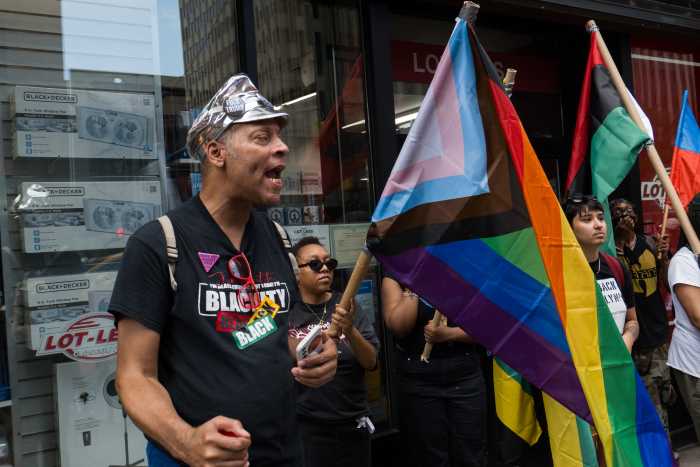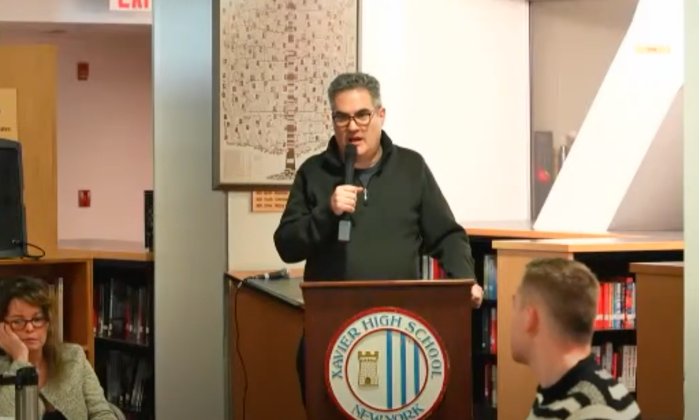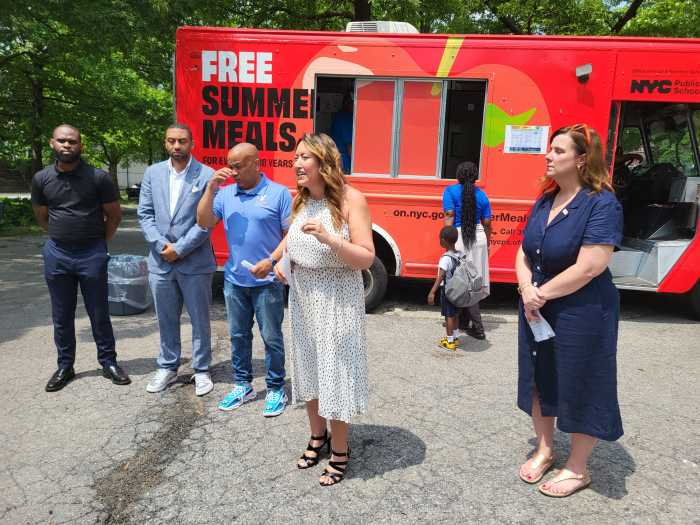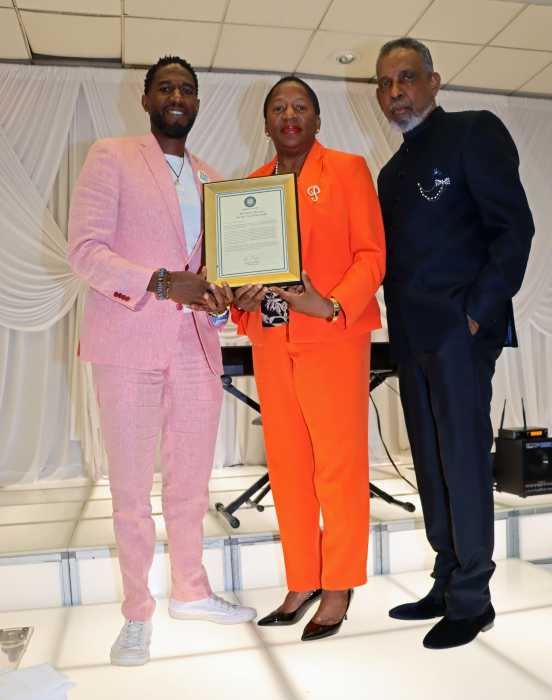Stuart Appelbaum, president of the New York City-based Retail, Wholesale and Department Store Union (RWDSU), in an exclusive interview, told Gay City News that his decision in May to openly affirm his gay identity within the American labor movement means, “I am defining myself publicly, and not just defining myself privately. That’s what makes a difference. I wanted to make my public role not just as a labor leader or Jewish labor leader, but as a gay Jewish labor leader.”
While other heavyweight US labor leaders, such as Randi Weingarten, president of New York’s United Federation of Teachers (UFT) and its parent, the American Federation of Teachers (AFT), and Nancy Wohlforth, secretary-treasurer of the Office and Professional Employees International Union (OPEIU), have come out publicly, Appelbaum is the first international labor president to publicly embrace his gay sexuality.
Stuart Appelbaum is first international labor leader in US to acknowledge he’s gay
Appelbaum, 56, oversees an international union with 100,000 members in the US and Canada that serves diverse sectors, from department stores, such as Macy’s, Bloomingdale’s, and Saks Fifth Avenue, to Canadian supermarkets and to poultry processing plants in the South, including Tyson Foods.
The ongoing legislative fight in New York for marriage rights for same-sex couples was critical in Appelbaum’s decision to come out. “Marriage equality is so important to me. I came out because of it,” he said. He discussed recent union struggles —for the rights of immigrant workers, for tough health and safety protections in manufacturing plants, for a paid holiday for Muslim workers celebrating Ramadan in a local union contract (the first such provision in a US labor contract), and for a statement by more than 40 US unions rejecting trade union boycotts of Israel — and asked, “How can I see justice and full acceptance denied to LGBT community, which I am part of, and do nothing? I wanted to be engaged.”
On June 20, Appelbaum spoke at the headquarters of Reverend Al Sharpton’s National Action Network (NAN) in Harlem about his “coming out and being gay,” and also urged an end to the political gridlock crippling the State Senate. It marked his first public speaking engagement in which he discussed his sexual orientation. The crowd at Sharpton’s House of Justice event included a dozen Democratic state senators, including conference leaders Malcolm Smith of Queens and John Sampson of Brooklyn, labor leaders, and hundreds of NAN supporters. Appelbaum argued it is “crucial for Senate Democrats to bring up marriage equality.” Sharpton, he said, “echoed my support for marriage equality.” In a moment of levity, Appelbaum told Gay City News, “If you told me a year ago that I would have done that, I would have had a heart attack.”
Appelbaum took the initiative in early June in drafting a letter to state senators on the marriage equality issue also signed by George Gresham, head of the massive health care workers’ union 1199, New York State AFL-CIO president Denis Hughes, Mike Fishman of Local 32BJ, which represents doormen, superintendents, and janitors, and Weingarten. The letter urged action in the current session of the Legislature.
Weingarten told Gay City News that it is “fantastic” that Stuart, as a labor leader, has outed himself. He is a” friend of mine and I am proud of him,” she said. “I hope for the labor movement that we are as understanding as we say we are.” Recalling her own public coming out two years ago, Weingarten said, “It weighed on my mind. What would the members think?” But the reaction, she said, has been “amazing,” adding that it is a “testament to the labor movement” that diversity is embraced. “Stuart is finding the same experience,” according to Weingarten.
Same-sex marriage legislation is also a crucial goal for Weingarten. She said the significance of the issue “hit me very hard” this year when her mother died. Weingarten’s sister and brother-in-law were with her in the hospital, and her mother’s impending death had them discussing “rights and responsibilities” in family relationships. She noted that the AFT and UFT have a powerful tradition of fighting for equality, and she is “very proud of my union” for embracing its minority group members and approving equal rights resolutions.
Asked about the significance of Appelbaum’s action, Richard Trumka, the AFL-CIO’s secretary-treasurer, wrote in an e-mail, “When a leader of Stuart’s stature comes out, it sends a powerful message that LGBT people are a vital part of the labor movement. I think that makes it easier for other LGBT trade unionists to come out.” Trumka, considered a likely successor to John J. Sweeney as president of the Federation’s 56 local unions and 10 million members, said the AFL-CIO supports marriage equality, but also noted, “It’s important to remember that one of the most important contributions unions can make to marriage equality is by fighting for spousal benefits at the bargaining table. Every time we win a contract that eliminates distinctions between same-sex couples and straight couples we’re showing politicians, the media, and others that marriage equality is an idea whose time has come.”
Anna Burger, chair of the more than six-million member union coalition Change To Win, which split off from the AFL-CIO in 2005, wrote in an email, “Our unions represent working women and men from all different backgrounds, far too many of whom are denied equal rights and protection under the law simply because of who they love. RWDSU president Stuart Appelbaum’s decision to come out and speak out for justice serves as another reminder to our LGBT friends, family, sisters and brothers that the labor movement stands at their side in the critical struggle for equality for every man, woman, and child in America.”
Trumka emphasized that “the labor movement is a natural ally of anyone fighting for human rights. Obviously, that includes the LGBT community. And it cuts both ways. For example, HRC, National Gay and Lesbian Task Force, and Empire State Pride Agenda in New York are strong supporters of the Employee Free Choice Act. They recognize that LGBT workers need a strong voice at work and that unions ought to be that voice. The bottom line is that you can’t be pro-gay and anti-union, and you can’t be pro-union and anti-gay.” The Employee Free Choice Act is labor’s top legislative goal in Washington; it would make it easier for workers to form and join unions against the often determined efforts of employers to block organizing efforts.
Nancy Wohlforth, secretary-treasurer of the Office and Professional Employees International Union a founder and co-president of Pride at Work (PAW), the AFL-CIO’s LGBT constituency group, said by e-mail that Appelbaum “has always been a solid supporter of PAW and lent help for rank and file member of RWDSU to serve on the PAW board for several years. I’m thrilled that he has come out after all these years and especially thrilled that he is lending his support to the struggle for equal rights and benefits through marriage equality.” Wohlforth was also frank about the distance labor still must travel, saying “Very few national labor leaders are on board with this fight, and I’m so happy to be joined by Stuart!”
Appelbaum, president of the RWDSU since 1998, has been at the forefront in offering domestic partnership benefits to the union’s staff, as well providing such benefits for tens of thousands of members enrolled in the union’s health and pension funds. Member unions of the RWDSU have won labor agreements that bar sexual orientation disagreements and offer equal partner benefits.
In May, Appelbaum joined the board of directors of the Empire State Pride Agenda Foundation, the non-profit educational affiliate of ESPA, New York State’s LGBT lobbying group. ESPA executive director Alan Van Capelle, who previously worked in Local 32BJ’s political unit, said, “Stuart Appelbaum busts the myth that many people hold that union members, and especially union leaders, are not interested in LGBT rights. They are and they can have a big impact on moving our community’s agenda forward… As an out gay man, he has had an impact on his fellow union leaders at the New York State AFL-CIO, where he serves on the Executive Council. He helped get that statewide organization of 2.1 million union members to adopt resolutions in support of marriage equality, GENDA [the transgender civil rights bill], and the Dignity for All Students Act. And when New York labor leaders speak, New York elected officials listen.”
While Appelbaum is not the ESPA board’s first union representative, Van Capelle said he is the first labor leader. He “brings an important perspective to the Pride Agenda Foundation board,” he continued. “Thousands of LGBT New Yorkers are members of unions, and he can help represent their perspective on the education and advocacy that the Foundation carries out. His own union has an excellent track record of building labor-community collaborations in diverse communities, and he can contribute to our efforts to build alliances not only with unions, but also with faith communities, progressive businesses, and communities of color.”
In coming out, Appelbaum has experienced what he termed an “amazingly supportive” embrace within organized labor and among friends, but his public acknowledgment of his gay identity was tinged with some regret. “My parents are gone,” he said. “I wish I had done it when they were alive.”
For Appelbaum, LGBT activism resonates in the same way as labor activism. “It is not enough to privately send checks,” he said. “I want to be an activist within the gay community and to fight for justice in all its permutations.”


































